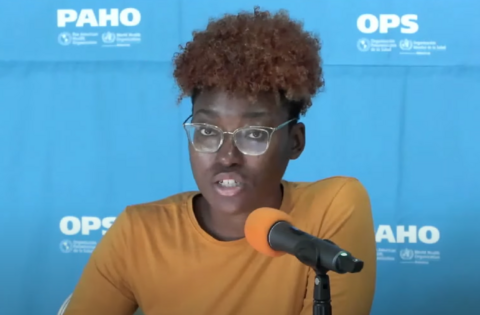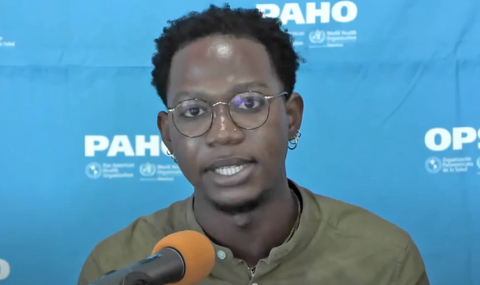
Bridgetown, Barbados, 5 September 2023 (PAHO) - A webinar with live panelists from Barbados and Chile signaled the start of recognition of World Suicide Prevention Day.
Hosted on September 5, the webinar was entitled United to Make Suicide Prevention a Priority. The live conversation provided a platform to discuss two different experiences from Barbados and Chile. There was also discussion on the role of media in appropriate suicide reporting as an evidence-based strategy to reduce suicide in the Region.
World Suicide Prevention Day is celebrated annually on September 10th and this year’s theme is ‘Creating Hope Through Action’. The day, which is organized by the International Association for Suicide Prevention (IASP) and supported by the World Health Organization (WHO), represents a global commitment to focus attention on suicide prevention.
The webinar was translated simultaneously in English, Spanish and Portuguese.
More than 500 viewers from across the Region of the Americas logged in to hear the following panelists from Barbados and Chile. From Barbados, the panelists were Dr. Joy Sue, Consultant Psychiatrist with the Ministry of Health and Wellness; Mr. Pierre Cooke Jr, Mental Health Advocate; and Ms. Chelsea Jordan, Youth Advocate. The panelists from Chile were Mr. Patricio López, Director of Radio University of Chile; Ms. Nerea de Ugarte, Influencer, Psychologist and Member of the First Mental Health Advisory Council of the Ministry of Health of Chile; and Mr. José Miguel Labrín, Director of the school of journalism at the University of Chile.
PAHO WHO Representative for Barbados and the Eastern Caribbean Countries (ECC), Dr. Amalia Del Riego, emphasized that suicide has a major impact on societies and requires greater attention.
“Suicide is a significant but often neglected public health issue. It is a human rights issue. Every case of suicide is a tragedy that severely impacts not only individuals but also families and communities.”
Dr. Del Riego added that “Making the health system more responsive to the needs of persons includes regular training of primary health workers about suicide prevention, specifically identification, management, support, and referral of suicidal individuals in communities, including coordination with social services. It also needs a systematic approach to address stigma and discrimination within the health system so that people are comfortable to access services.”
PAHO/WHO Representative for Chile, Dr. Fernando Leanes, stated that although COVID-19 brought catastrophic consequences in terms of mental health, it also led to greater transparency on the topic.
He said: “I think it also meant that we could now clearly delineate the path forward so that we could overcome stigma, overcome bullying, and overcome many other toxic relations that we see in society. This is a change that focuses on tackling this issue (to) see how we can change trends.”
Dr. Leanes added that the world report on mental health from the WHO clearly shows mental health is a major burden on health care and attitudes need to be changed. “We need actions, prompt actions, so that we can more successfully grapple with these challenges.”
Attendees at the webinar heard this from the panelists.
Dr. Joy Sue said the Ministry of Health and Wellness in Barbados spearheaded a mental health communications strategy to reduce stigma and encourage persons to seek help. She mentioned a workshop held recently for the Barbados media and said the Ministry is planning a workshop for the police to address how information is released to the media. Dr. Sue also spoke of additional training for mental health professionals to better equip them.
Chelsea Jordan spoke of giving a voice to those who are not privileged to be invited among the decision makers. Youth advocates such as her had a responsibility to those who do not have such opportunities, she said. Jordan added that education is key to dismantling stigmas especially among the youth and males who may think it is not masculine to seek help. When developing policy, she suggested, experts with the experiences should be included from the start of policy development.
Pierre Cooke Jr addressed the need for more safe spaces where those seeking help felt comfortable to share. He said there is a stigma attached to seeking mental health assistance in Barbados and seeking help privately is expensive. Cooke acknowledged that it is not just the responsibility of the Government to help but urged society to learn to listen actively, to notice the signs of isolation and behavioural change and approach people with care and empathy.
From Chile, attendees heard from Patricio Lopez that when public figures commit suicide, the emphasis when publicising should be on prevention measures. He stated that some information is news, and some is not. Ongoing education on factors that affect mental health is essential, he said, and advised journalists to avoid stigmatized language. Lopez said there is a need to generate a feeling of empathy.
Nerea de Ugarte told those developing social media messaging that they must assume responsibility for their messaging. Mass communication can portray sexist images and stigma, de Ugarte reminded. She encouraged giving a space to experts on social media to give the experts an opportunity to assure individuals that they are not alone.
José Miguel Labrín recommended that sensationalism be limited. He encouraged journalists to monitor public policies and endeavor to generate dialogue among stakeholders. Labrín said that there must be an awareness that there are students who are affected by mental health issues.
The webinar United to Make Suicide Prevention a Priority is available on the YouTube channel.







